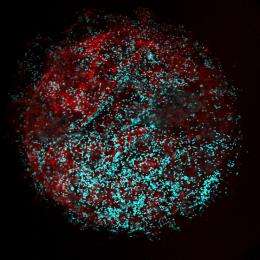Protecting embryos against microbes

Headed by the Kiel zoologist Professor Thomas Bosch, a team of scientists from Germany and Russia succeeded in deciphering the mechanisms, for the first time, with which embryos of the freshwater polyp Hydra protect themselves against bacterial colonization. The paper will be published today in the online edition of Proceedings of the National Academy of Sciences (PNAS).
The researchers from Kiel University found a completely different composition of bacterial colonization in Hydra embryos compared to that of adult polyps. Extensive analysis by microbiologist Sebastian Fraune and biochemist René Augustin showed that the embryos are equipped with a so-called antibacterial peptide by the mother. During the first days of development, this ensures that only certain benign bacteria settle on the embryo.
"We suspect that these bacteria protect the embryo by occupying microbial habitats and keeping other, more dangerous germs away", explains Bosch. The methods of producing transgenic polyps developed in his laboratory helped the researchers to clarify if and how the bacterial population changes in an adult organism, if the polyps produce certain antibacterial peptides in higher quantities. As the scientists report in PNAS, they found that antibacterial peptides also drastically alter the composition of the bacterial colonization in adult polyps.
For years, biologists had restricted the function of antibacterial peptides to killing microbes. In the meantime, there are more and more indicators that these tiny protein molecules are responsible for the composition of the bacterial colonization. Every organism – including the human body – possesses a completely individual profile of bacterial population. The microbial community is obviously already set at the time of birth by a set of antibacterial peptides. These bacteria then ensure that we stay healthy. Many diseases result from disrupted communication between man and microbe.
Hydra belong to the phylum Cnidaria. Members of this phylum are over 600 million years old and were present at the beginning of animal evolution. In their original state, they preserved molecular switches which can also be found in humans in a similar form. With Hydras' practically unlimited regenerative ability and their lack of an ageing process, the old Hydra model system does not only earn a key position in modern evolutionary biology, but also provides new approaches to biomedical research. The Kiel scientists are working step by step towards the solution of this large puzzle, to clarify which bacteria perform which role.
More information: The paper is available for download here: www.uni-kiel.de/download/pm/20 … 0-153-bosch-pnas.pdf
Provided by Kiel University















